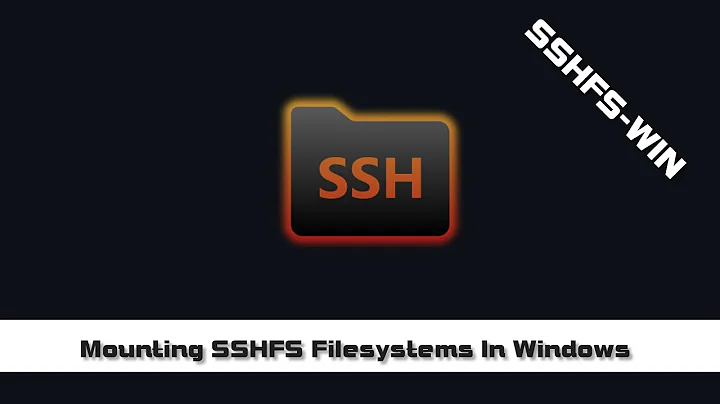sshfs always asking for password in fstab?
Solution 1
Key-based authentication can only work if the ssh process can find your key. You presumably have your key in your home directory; but you've never told sshfs where to look for a key. At boot time, it would be root mounting all filesystems, therefore the key must be either in /root/.ssh or referenced in /root/.ssh/config.
I recommend mounting the filesystem after you've logged in, and as your own user. Put this in a script that's executed when you log in:
ssh-add ~/.ssh/name_of_key.id_rsa
sshfs homeserver:/media/usb0 ~/exthd
Put an alias called homeserver in your ~/.ssh/config:
Host homeserver
HostName 192.168.0.2
User oli
Solution 2
I was able to make sshfs mount via fstab with Ubuntu 14.04 by doing using the following syntax as a standard user (note anything in CAPS is a variable for you to fill in):
USER@HOST:/REMOTE_DIR /LOCAL_DIR fuse.sshfs delay_connect,_netdev,user,idmap=user,transform_symlinks,identityfile=/home/USERNAME/.ssh/id_rsa,allow_other,default_permissions,uid=USER_ID,gid=USER_GID 0 0
This is a combination of the information found here https://superuser.com/questions/669287/automount-sshfs-using-fstab-without-mount-a and adding the delay_connect from here https://askubuntu.com/questions/326977/sshfs-is-not-mounting-automatically-at-boot-despite-etc-fstab-configuration.
I used this tutorial to get my USER_ID and USER_GID: https://kb.iu.edu/data/adwf.html
To find a user's UID or GID in Unix, use the id command. To find a specific user's UID, at the Unix prompt, enter:
id -u username
Replace username with the appropriate user's username. To find a user's GID, at the Unix prompt, enter:
id -g username
Also, if you want a full tutorial, it will be posted at https://www.variux.com/sshfs-automount-at-boot-with-fstab-on-ubuntu-14-04/
Solution 3
I had the same problem.
I had previously setup ssh keys via the ssh-keygen and then ssh-copy-id -i ~/.ssh/id_rsa.pub [email protected]
ssh worked fine without asking me for a password so I was confused as to why sshfs still wanted the password...
That is to say,
ssh [email protected]
worked fine, however sshfs still asked for a password when I typed
sudo sshfs [email protected]:/home/raspberry/Videos /home/pi/LinuxMintMountedFolder/ -o allow_other
As Gilles above explained, sshfs was looking in the root directory for the necessary keys.
Therefore, I solved this by just copying the files id_rsa and id_rsa.pub from my home folder's hidden .ssh folder to the root's .ssh folder i.e.
cp /home/pi/.ssh/id_rsa /root/.ssh/
cp /home/pi/.ssh/id_rsa.pub /root/.ssh/
Then, typing the following worked without bothering me for a password:
sudo sshfs [email protected]:/home/raspberry/Videos /home/pi/LinuxMintMountedFolder/ -o allow_other
Solution 4
You actually can mount SSHFS without public key on startup by using the password_stdin option, but not with fstab.
What you need is a little script file and cron.
Please be aware that public key always is a better choice. But sometimes public keys don't work (I have had that issue a few times myself). Please note that the script file will contain the password in plain. Therefor you should make sure that only root has any permission to this file!
The script file can look like this (/root/automount.sh):
#!/bin/sh
if [ $(mount | grep 'user@server:/folder' | wc -l) -ne 1 ]
then
echo 'PASSWORD' | sshfs user@server:/folder /mnt/mountpoint -o password_stdin,allow_other
echo 'SSHFS has been mounted.'
else
echo 'SSHFS is already mounted.'
fi
To run this on startup you can use crontab as root and enter this line:
@reboot /root/automount.sh
As stated above, you should make sure that absolutely nobody can read the file as it contains plain text password!
-rwx------ 1 root root 526 Nov 21 12:57 automount.sh
By now, after every reboot your system will automatically mount the SSHFS by using credentials.
Solution 5
Works for me perfectly on Debian 8.2 adding the following line to fstab:
user@hostname:/path/to/localmountpoint /path/to/remotemountpoint fuse.sshfs _netdev,user,port=(if_not_22),idmap=user,transform_symlinks,identityfile=/home/user/.ssh/id_rsa,allow_other,default_permissions,uid=user_id,gid=group_id 0 0
Hostname indicates the remote server (folder to mount from) user is the same locally and remotely. (easier)
Make sure you have created locally the ssh key for the user using ssh-keygen and use ssh-copy-id to copy the key to remote server (hostname).
You can find user_id and group_id for the user in local server /etc/passwd.
Also make sure that the user has read/write permissions in the folder path/to/localmountpoint.
UPDATE FOR DEBIAN 10
user@server:/share /mnt/share fuse.sshfs defaults,nonempty,allow_other,IdentityFile=/home/user/.ssh/id_rsa 0 0
Related videos on Youtube
semiserious
Updated on September 18, 2022Comments
-
semiserious almost 2 years
I'm trying to enter an sshfs mount in /etc/fstab with the following line:
sshfs#[email protected]:/media/usb0 /media/ExtHD fuse defaults,nonempty,allow_other 0 0So that this volume is mounted at boot. After booting up, nothing happens, but when I use the command sudo mount -a, I am always prompted for the password. I have set up SSH Keys and transferred them over to the computer at 192.168.0.2, and can log in to regular ssh with no pasword. How can I stop fuse from asking for my password so that the volume can be automatically mounted at boot time?
If it helps at all, I am trying to connect to a home server running Debian from a laptop running Arch Linux. Thanks
-
semiserious over 12 yearsAhh, that is a better way of doing it, I didn't think to put it in my login script. Thanks!
-
Nick over 10 yearsBe careful using
~in the mount point. If you're using a launcher icon on the panel to run the command instead of a terminal, the~may not be evaluated as/home/and the command will fail. -
 Gilles 'SO- stop being evil' over 10 years@Nick If you're using a GUI, it might have a tool dedicated to automounting. If you follow my answer, you're to put the two commands in a shell script; the launcher icon would run that script.
Gilles 'SO- stop being evil' over 10 years@Nick If you're using a GUI, it might have a tool dedicated to automounting. If you follow my answer, you're to put the two commands in a shell script; the launcher icon would run that script. -
Christian Wolf almost 6 yearsThis is really really bad from a security perspective. Better create a separate set of keys for root and add this as well to authorized_keys. You should never copy private keys around.
-
Will Matheson over 4 yearsFantastic, works great for me. Some things for other people not to forget (which I totally didn't neglect to think about): 1. Make the
automount.shscript executable (perhaps as illustrated). 2. Make the mountpoint directory in advance. 3. Also in advance, SSH to your target server as root to get that server added to root's known_hosts. -
Will Matheson over 4 yearsWhile the script works and I'm still using it, calling it out of cron is a crapshoot because sometimes networking is ready and sometimes it isn't. I'm on Ubuntu 18.04 and so systemd was the way to go for this: askubuntu.com/a/1184762/870100
-
 Sawyer over 3 yearslook like a good way to go with
Sawyer over 3 yearslook like a good way to go with




